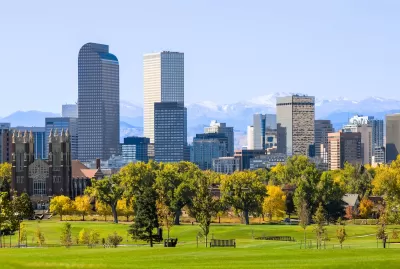The city will change its landscaping rules to prohibit “non-functional turf” and encourage native and climate-resilient vegetation.

The city of Denver is revamping its landscaping requirements to encourage more sustainable, resilient landscaping. As Ysabelle Kempe explains in Smart Cities Dive, the new rules will apply to new developments and some redevelopment projects in the city.
The new rules will be established after a public engagement process that will begin in 2025. “Across Denver, non-functional turf covers areas along roadways and in medians and parking lots. A 2024 study finds that 74% of Denver’s turf is on private land, according to a Dec. 9 presentation by city staff to the budget and policy committee.” The city also has some of the lowest tree canopy coverage at 15 percent.
A Colorado state law passed earlier this year bans non-functional and artificial turf in commercial, industrial, and institutional developments. Denver’s updated regulations will apply to all landscaping in the city and county, but will not affect existing landscaping.
FULL STORY: Climate resilience top of mind for Denver as it plans to revamp landscaping rules

Planetizen Federal Action Tracker
A weekly monitor of how Trump’s orders and actions are impacting planners and planning in America.

Maui's Vacation Rental Debate Turns Ugly
Verbal attacks, misinformation campaigns and fistfights plague a high-stakes debate to convert thousands of vacation rentals into long-term housing.

San Francisco Suspends Traffic Calming Amidst Record Deaths
Citing “a challenging fiscal landscape,” the city will cease the program on the heels of 42 traffic deaths, including 24 pedestrians.

Amtrak Rolls Out New Orleans to Alabama “Mardi Gras” Train
The new service will operate morning and evening departures between Mobile and New Orleans.

The Subversive Car-Free Guide to Trump's Great American Road Trip
Car-free ways to access Chicagoland’s best tourist attractions.

San Antonio and Austin are Fusing Into one Massive Megaregion
The region spanning the two central Texas cities is growing fast, posing challenges for local infrastructure and water supplies.
Urban Design for Planners 1: Software Tools
This six-course series explores essential urban design concepts using open source software and equips planners with the tools they need to participate fully in the urban design process.
Planning for Universal Design
Learn the tools for implementing Universal Design in planning regulations.
Heyer Gruel & Associates PA
JM Goldson LLC
Custer County Colorado
City of Camden Redevelopment Agency
City of Astoria
Transportation Research & Education Center (TREC) at Portland State University
Jefferson Parish Government
Camden Redevelopment Agency
City of Claremont





























